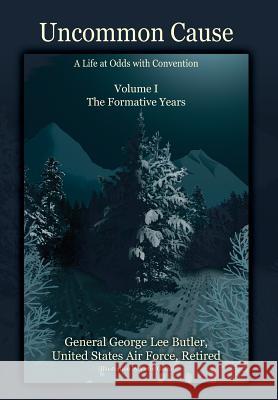Uncommon Cause - Volume I: A Life at Odds with Convention - The Formative Years » książka
Uncommon Cause - Volume I: A Life at Odds with Convention - The Formative Years
ISBN-13: 9781478709657 / Angielski / Twarda / 2015 / 426 str.
This engaging autobiography traces the life of a shy, insular lad, born into an Army family with roots in the rural South, who gained an unlikely acceptance to the fledgling Air Force Academy in 1957, survived a career punctuated by an unrelenting series of personal and professional crises, and took command of the Air Force's strategic nuclear forces just as the Cold War was drawing to a close. Seizing the moment, General Lee Butler won Presidential approval for a merger of the bombers and land-based missiles in his charge with the Navy's ballistic missile bearing submarines. This long overdue centralization of command authority also set the stage for a wholesale reorganization of the Air Force's conventional combat and support aviation, sweeping changes to the nuclear war plan that eliminated thousands of targets, and a concomitant reduction in the size of the nuclear arsenal. These initiatives, in turn, saved tens of billions of dollars, helped build trust with his Soviet counterparts, and facilitated advances in nuclear arms control. More importantly, by the time his military career ended, General Butler had developed a profound concern regarding the intolerable dangers posed by the vast nuclear weapon enterprises in the United States and the Soviet Union. From his vantage point of unparalleled experience, he saw the inherent folly of "Mutual Assured Destruction," premised on a host of assumptions that he came to see as largely unwarranted. Even so, he entered retirement in 1994 convinced that the close of the Cold War era would also bring a renewed urgency to ending reliance on nuclear weapons as instruments of military power. That faith was quickly shattered by the political upheaval in both Washington and Moscow. The rekindling of distrust and loss of momentum in arms control prompted General Butler to return to public life. His eloquent appeal for the elimination of nuclear weapons created a global sensation, eliciting praise and condemnation in equal measure, marking the start of a fascinating campaign that laid bare the powerful sway these weapons hold over present and aspiring members of the nuclear club. While the most galvanizing chapters of General Butler's narrative speak to his role in reshaping U.S. defense policy in response to the collapse of the Soviet Union, it remains faithful to his larger purpose: a retrospective, one that often reads like a novel. He tells his story with unsparing candor, leavened with a personal touch and a stream of anecdotes both humorous and poignant. He writes from a family perspective, a tribute to his wife, Dorene, and children, Brett and Lisa, to whom he dedicates his book. The family knew well the hardships and sacrifices of military life, including constant uprooting; their son and daughter attended ten schools in twelve years. Dorene's devotion mirrored that of her husband, and her role, documented in these pages with great affection, was central to his career. One reviewer distilled perfectly the essence of their captivating relationship, "This is above all a love story."











